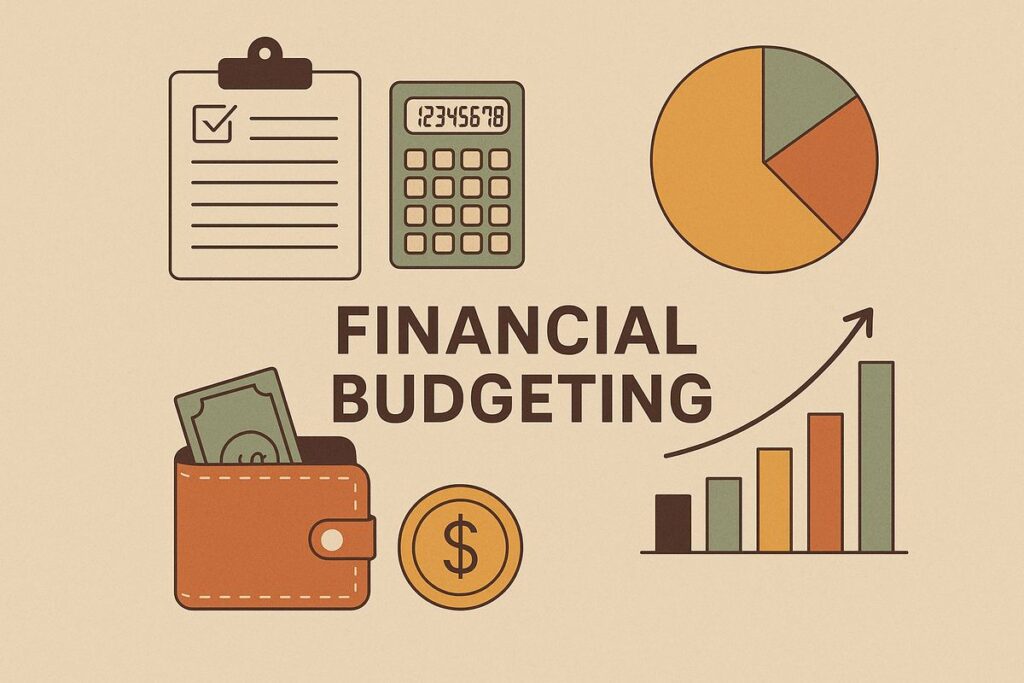

Value for Money means making the most of every rupee you spend , it is more critical than ever to spend your money wisely. With the rising cost of living, uncertain futures, and personal aspirations, budgeting can provide the peace of mind and future security you want, instead of creating great habits. Whether you’re a student making sure your first paycheck lasts into next month or a professional managing monthly living expenses, adequate financial planning can empower you, ease your mind, and future-proof your lifestyle.
This article will address key budgeting principles, saving tips, and great tips that will help you maximize your income not restrict it and not stress about it!
What is budgeting and why is budgeting so important? Budgeting is the plan you make with your money. It is the process of estimating your future income and expenses over a fixed time (usually a month) and assigning rates of your income towards your needs, discretionary spending, savings, and future investments.
Though budgeting is not limited to minimizing excess expenditure, it is fundamentally about allowing you to make informed money choices.

Top Reasons to Create a Budget:
Provides Financial Control:
A well-designed budget allows you to understand your spending habits, helping you make choices, instead of reacting.
- Helps You to Reduce or Eliminate Debt:
Without a budget it is easy to spend more than you have and to rely on credit. A budget allows you to make strategic choices about your allocation of resources and make a plan to pay down the debt, eliminating unnecessary spending.
- Allows a Plan for Emergencies:
Life can be unpredictable. A good budget will include a plan for an emergency fund to ensure that you are not financially devastated just because something unexpected arose such as medical bills or car repair or job loss.
- Helps You Achieve Your Goals:
Everyone has goals in their life whether it be to purchase a new home, start a business, or take a dream vacation. A budget can help you organize your immediate and long-term goals and provide a plan on how to get there without sacrificing too much in the process.
- Allows for Improved Financial Well-being:
By knowing you have the bills paid, and the savings accumulating gives you clarity to your financial future and lessens anxiety around money.
Overview to Create a Simple But Effective Budget
Creating a budget might sound daunting, but it isn’t complicated. Follow along with these systematic steps to get started:
Step 1: Find Your Monthly Income
Find all sources including, salary, freelance work, investments, government assistance, and side jobs. Always use net income (the amount you actually make after taxes) to ensure accuracy.
Step 2: Identify your monthly expenses
You can break your spending into two main categories:
Fixed Expenses: Rent/mortgage, car payment, insurance, memberships
Variable Expenses: Groceries, gas, electricity, entertainment, dining.
To learn good habits, I recommend keeping track of that you actually spend for a month by using an app, spreadsheet, or even a notebook.
Step 3: Sort your expenses and prioritize
Separate your expenses into needs, wants, and savings/debt repayment. This is where the 50/30/20 rule comes into play:
50% for needs (housing, utilities, groceries)
30% for wants (dining, shopping, travel)
20% for saving and debt repayment
Of course, you may modify these percentages based on your lifestyle and goals.
Step 4: Find a spending limit
At this point, you can limit each section of spending by using a realistic number. You’ll want to make your limits comfortable. If you cut limits too low, you risk frustration when the inevitable happens and fail.
Step 5: Keep a Close Eye and Track Regularly
Keeps tabs on a budget isn’t a one-time event. Review one month to the next for changes in income, expenses, and goals. There are some apps like Mint and YNAB (You Need a Budget), or you can even just use a simple Excel sheet to keep track of your budgeting.

Saving: The Key to Financial Independence
Budgeting tells your money where to go, while saving ensures you have your money when it counts.
The practice of saving money is setting aside a portion of your income for a future purpose. As simple as that sounds, many people have a difficult time saving money; Generally it comes down to low income, high taxes, high cost of living, or not enough discipline. Regardless of the reason, even if you must save small amounts of money, if you save that same small amount regularly, it becomes much easier to save, and it can accumulate to be significant down the road.
Types of Savings Everybody Should Have:
- Emergency Savings:
Emergency fund should hold enough money to cover 3-6 month’s worth of living expenses. An emergency fund is simply an insurance policy to ensure added stress from the emergencies of life doesn’t accelerate your financial downfall.
- Short-Term Savings:
These are savings for things on the horizon such as travel, family gifts , home repairs, or other upcoming expenses.
- Long-Term Savings:
This savings is geared toward larger life goals. Such as saving to purchase a home, and being financially ready for retirement, child education, opening a business, etc.
- Retirement Savings:
In many countries you may have access to 401K, pension, retirement funds, and other investment accounts to save for retirement. Being educated about retirement funding in your country and your individual investment choices is an investment in yourself.
Best Ways to Save Money
- Pay Yourself First:
Saving should be treated like a bill you don’t miss! Setup immediate transfers to your savings account when you get paid each week, or when you receive monthly income.
- Start Small, Stay Consistent:
It doesn’t matter if you save ₹500 or $10 each week. It is important to stay consistent. In the long-run, being consistent is better than saving a larger amount when the time comes.
- Use Unexpected Cash Wisely:
Use them for savings first! Examples of this would be bonuses, tax refunds, gifts, etc. Save at least 50% of Unexpected funds before spending.
- Cut Costs:
Audit your lifestyle for discretionary costs (do you really need 3 streaming subscriptions, or daily takeout? Can you let them go??). You would be surprised what a little cut costs can create in the savings column.
- Use the 24-Hour Rule:
If you have money for a bonus purchase and are unsure, wait a day. Let the 24-hours pass and see if you still want, or need it. Generally, the urge will pass or diminish and money will be saved.
- Avoid Lifestyle Inflation:
As your income increases, watch the rate at which your spending increases in proportion. You do not want to start spending based on the amount you earn, but rather the amount you can save.
- Shop Smart:
Make sure that you are shopping “smart” for the necessities of life (use discount coupons, cashback apps, loyalty rewards, bulk purchases, etc.).

Common Budgeting and Saving Mistakes You Should Try to Avoid
- Not Considering Irregular Expenses:
Gifts, car maintenance, annual subscriptions…things like this can ruin your budget if you don’t prepare for them!
- Setting Unrealistic Goals:
When you go really far on cutback budgets, you will ultimately fail because you burnt yourself out. Make sure to leave some wiggle-room for fun and flexibility.
- Ignoring Everyday Purchases:
That $3.50 cup of coffee or $2 cookie here and there adds up. Track it all! Even the littlest things.
- Putting things on credit to fill in gaps:
Credit cards can be used to your advantage, but when it comes to covering your regular expenses with them, we have major budgeting issues.
Tools and Resources That Will Help You Be Successful
- Budgeting Apps: Mint, PocketGuard, YNAB, GoodBudget
- Saving Apps: Digit, Qapital, Acorns, Chime
- Basic Spreadsheets that you can use: Google Sheets or Excel (that also include pre-built budget templates).
- Books: The Total Money Makeover by Dave Ramsey; Your Money or Your Life by Vicki Robin.

Final Thoughts
Budgeting and saving are not about restricting yourself—but getting your money to work for you through a little planning, discipline, and patience. Anyone can build financial stability and eventually, freedom.
You just have to start today. Even if it seems like baby steps, you’re still moving forward. Whether you want to pay off debt, build an emergency fund, save for a vacation, or save for retirement, the power is in your choices every single day.
Now take that first step:create that budget, set your goals, and begin your journey towards saving money. Your future self will be thanking you.
Are you prepared to take charge of your money? Start today with one tiny habit—for one week, track your expenses to get an understanding of where your money is going. Awareness is first step to transformation.
Finance related website posting blogs on topics savings, budgeting , investment etc
